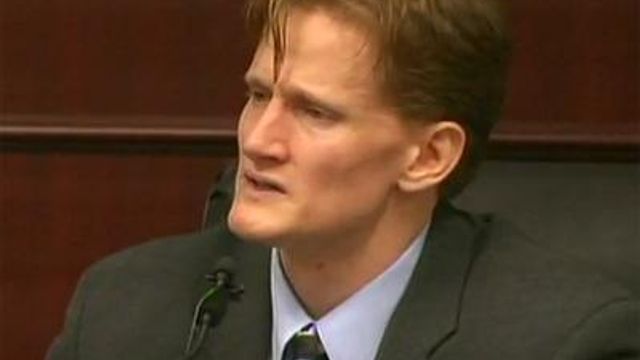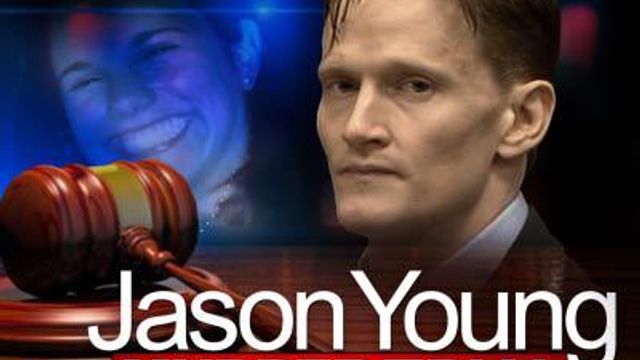Mistrial declared in Michelle Young's beating death
A deadlocked jury prompted Superior Court Judge Donald Stephens to declare a mistrial Monday in the murder trial of Jason Young, whose pregnant wife, Michelle Young, was killed nearly five years ago in their Raleigh home.
Posted — UpdatedAfter deliberating for about two hours Monday morning, the jury foreman sent a note to Judge Donald Stephens saying the seven men and five women were at an impasse and "immovably hung" at a 6-6 verdict vote.
Although Stephens instructed the jurors to continue deliberating, by 4 p.m., they still were unable to reach a decision with an 8-4 vote on a verdict. It's unclear what the verdict was.
In all, the jury deliberated more than 12.5 hours since receiving the case on Thursday.
Neither prosecutors nor defense attorneys would comment on the case. Family members of both Michelle Young and Jason Young also declined to comment.
"There's really nothing to say," Michelle Young's mother, Linda Fisher, said.
Jason Young, 37, remained in the Wake County jail Monday evening, where he's been held since his arrest in December 2009.
Whether the case will be tried again remains unknown. Prosecutors could announce their decision next month at the court's quarterly homicide status hearing.
Local defense attorney and former federal prosecutor Dan Boyce, who is not affiliated with the Young case, said the decision could be based on a number of factors, including juror interviews and what direction the jury was leaning toward in that 8-4 vote.
"There's also a way this case could be resolved without a trial," Boyce said.
Jason Young could also plead guilty to a lesser charge or accept an Alford plea, where a defendant doesn't have to admit guilt but accepts a plea because it is in his or her best interest, Boyce said.
The nature of Michelle Young's Nov. 3, 2006, slaying and the mystery surrounding it attracted widespread national attention, with People magazine even featuring it on the cover of its Jan. 27, 2007, issue – a young mother found brutally beaten to death with her 2-year-old daughter, unharmed, in the same room and tiny bloody footprints all over the crime scene.
A medical software salesman at the time, Jason Young said that he was out of state on business and was sleeping in a Virginia hotel when his wife was killed.
Jason Young admitted that he wasn't a proper husband to his wife but that he loved her, their daughter Cassidy and unborn son Rylan, and that he was devastated by the loss.
"It was a brilliant move by his defense," former Cumberland County Assistant District Attorney Billy Richardson, said.
Prosecutors cross-examined Jason Young for less than an hour and never asked him about the night of the crime, which Richardson said could have been a mistake.
"I think what the prosecution was thinking there was, 'We know he's going to say he didn't do it, so why give him a chance to say that?'" Richardson said. "I think they should have looked him in the eye and say, 'You did this, didn't you?' The fact that they didn’t, didn't give the jury the opportunity to gauge and weigh his credibility from a cross-examination perspective."
He checked into a Hampton Inn in Hillsville, Va., on the night of Nov. 2, 2006, and drove 169 miles back to his home, the state said. He beat his wife with at least 30 distinct blows to the head, drugged his daughter with adult-strength cold medicine, which causes drowsiness, and returned to Virginia to continue with his business trip.
Defense attorneys argued that someone else, possibly two people, killed Michelle Young, noting DNA evidence found inside the house didn't match their client.
There was no physical evidence linking him to the crime, his attorneys said. He didn't have time to commit the crime, and even circumstantial evidence showed that he didn't do it, they said.
"The ability to put together the physical evidence, or lack of physical evidence – some of the circumstantial evidence – I think probably had a big impact on the case also," Boyce said. "Normally, in a case, you have all the scientific evidence coming into play. Here, it was the opposite. It actually played to the advantage of the defense team."
• Credits
Copyright 2024 by Capitol Broadcasting Company. All rights reserved. This material may not be published, broadcast, rewritten or redistributed.






